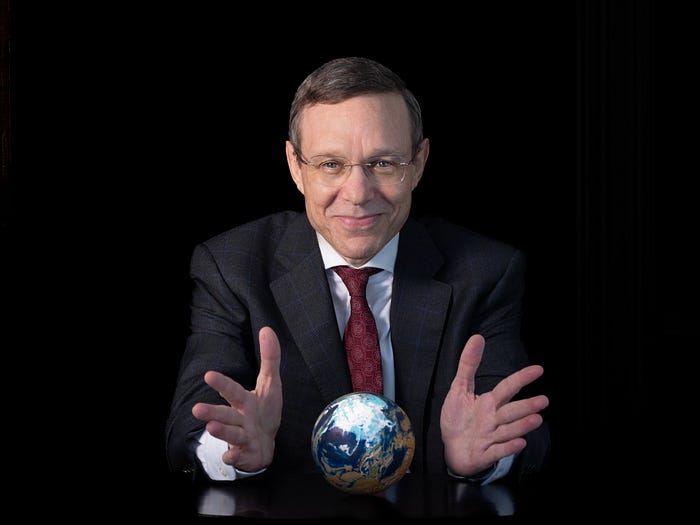
A distinguished professor at a prestigious university wrote to me yesterday: “I am having trouble these days getting out of bed in the morning as the world seems insane.” Her message resonated with me because it arrived just a few minutes after a meeting with my research group of students, postdocs and research associates, where I summarized my winter-break visit to Israel with the words: “Given the wars in the Middle East and Ukraine, the worldwide rise in antisemitism, the sympathy towards terrorism followed by silence after the rape of Israeli women on October 7, the subsequent turmoil at Harvard university — ranked lowest on the scale of college free speech by FIRE’s survey a month before October 7, the steady denial of evidence-based science in favor of opinion-based narratives by social media mobs and news reporters… altogether, the world appears to be seriously broken. Can we still fix it or is it a lost cause?”
The alternative response is to retreat into a “vacation mode” and enjoy our personal life and academic inquiry as long as it lasts. We are under no obligation to carry the weight of the world on our shoulders. When our home is on fire, we can take a vacation on a remote island of academic isolation. Should that be the advice I give to my research group?
Anyone who met me knows that I am not a vacation advocate. Last summer, I led an expedition to the Pacific Ocean and worked around the clock to collect evidence about the first reported meteor from outside the Solar system — based on data from US government satellites.
Why did I sacrifice my annual vacation time on the altar of science? Because an object from interstellar space might carry a message for our salvation. Any physical evidence that we are not alone in our cosmic neighborhood would make fighting over terrestrial territories look insane for the same reason that family feuds stop when neighbors show up at the doorstep.
Our political troubles stem from a tendency to congregate into tribes and engage in hate of members from other tribes. During ancient history, the size of congregations was limited by the ability of people to gather together in the same physical space. But today, tribalism and hate are amplified by social media which enable the congregation of enormous crowds on virtual platforms. The virtual world ends up shaping the real world and calamities are triggered by protestors who engage in aggressive action based on superficial opinions without fact checks or a historic perspective.
On this backdrop, devout advocates often violate the principles that they wish to promote. They pretend to promote women’s rights but remain indifferent to women being raped by Hamas terrorists; they pretend to promote minority rights but remain indifferent to anti-Semitic sentiments; they pretend to promote freedom of speech but allocate it only to those who agree with them; they pretend to promote evidence-based science only when the evidence supports their opinion. When virtue signaling fosters oxymorons, it is clear that we live in an Orwellian society doomed to destruction.
Perhaps I am naïve. But my thinking is that learning about the existence of a more intelligent civilization in outer space would inspire us to unite. It makes little sense to engage in tribalism and hate on a ship that sails through turbulent waters after receiving a message in a bottle about a safe haven that lies beyond the horizon. Scientific knowledge about an intelligent civilization could unite us in the same way that a physical proof for the existence of God would unite a religious congregation because its super-human qualities would trigger awe and suppress the ego of all spectators.
I appreciated the power of a collaborative mindset during our Pacific Ocean expedition, when all team members worked constructively for the success of the mission. Humanity’s ship is Earth and the turbulence we feel so far is our own creation on deck. Evidence about what lies beyond our horizon should serve as our inspiration.
The next scientific expedition to the Pacific Ocean will attempt to retrieve larger pieces of the first studied interstellar meteor. If the object will end up being a rock, so be it. The Galileo Project team will continue to search for other interstellar objects. Irrespective of how many interstellar rocks we identify, the first message we recover in an interstellar bottle could inspire us to come together and fix our world.
We should not rest until we extinguish the flames of tribalism and hate ignited by superficial protestors on the deck of our ship. Our long-term survival will be the ultimate manifestation of our collective intelligence.
ABOUT THE AUTHOR

Avi Loeb is the head of the Galileo Project, founding director of Harvard University’s — Black Hole Initiative, director of the Institute for Theory and Computation at the Harvard-Smithsonian Center for Astrophysics, and the former chair of the astronomy department at Harvard University (2011–2020). He chairs the advisory board for the Breakthrough Starshot project, and is a former member of the President’s Council of Advisors on Science and Technology and a former chair of the Board on Physics and Astronomy of the National Academies. He is the bestselling author of “Extraterrestrial: The First Sign of Intelligent Life Beyond Earth” and a co-author of the textbook “Life in the Cosmos”, both published in 2021. His new book, titled “Interstellar”, was published in August 2023.
